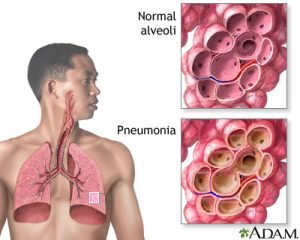 Bacteria (in particular pneumococci) represent the leading cause of pneumonia.
Bacteria (in particular pneumococci) represent the leading cause of pneumonia.
Viral pneumonia can be caused by a range of viruses, including those that are responsible for the common cold and severe acute respiratory syndrome (SARS), the recent outbreak of which became a global health concern.
Pneumonia outside hospital
For most countries, studies are not available on the causes of community-acquired pneumonia (CAP). However, more than 10 different microbial causes of CAP have been recognised.
Pneumonia in hospital
Limited information is available on the causes of nosocomial pneumonia (NP). However, the pathogenic agents that cause NP appear to differ between early-onset NP (that occurs within 4 days of hospitalisation) and late-onset NP (occurring after 4 days).
Multidrug resistance
Bacteria causing CAP are increasingly resistant to commonly used antibiotics in most European countries.
Multidrug resistance is also increasingly common in NP.
Risk factors
Smoking is the single most important identified preventable risk factor for CAP.
Increasing age, chronic obstructive pulmonary disease (COPD) and previous respiratory infections also increase the risk of developing CAP.
In older patients, alcoholism, asthma, immunosuppressive therapy, lung diseases, heart disease, institutionalisation and increasing age are related to the risk of contracting pneumonia.
Spread of infection
Situations where many people are in close contact (e.g. schools, army barracks, prisons, shelters for the homeless) facilitate the spread of some of the more infectious causes of pneumonia, leading to local epidemics. Certain occupations (e.g. farming) are linked to some of the most common causes of pneumonia.
